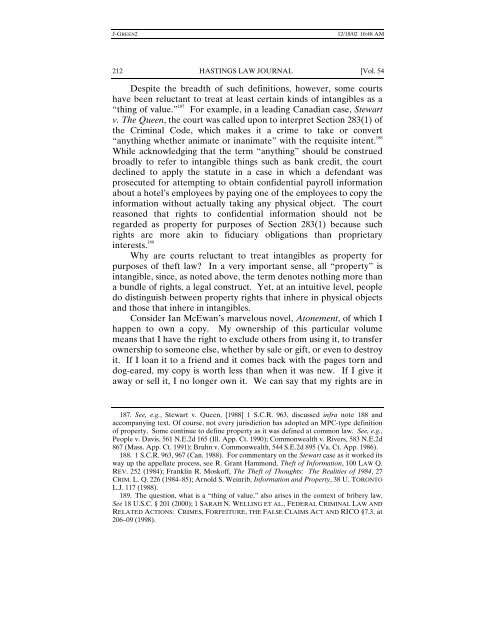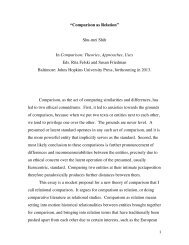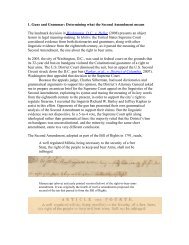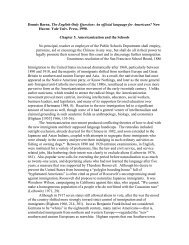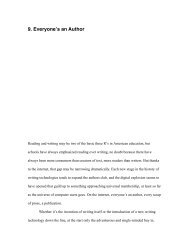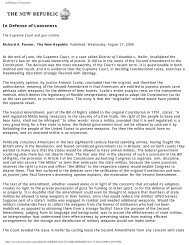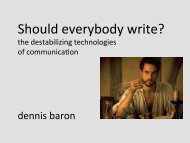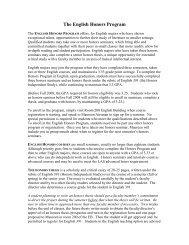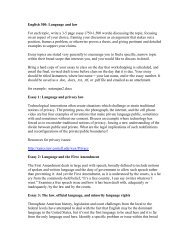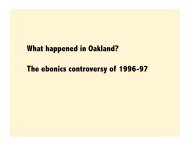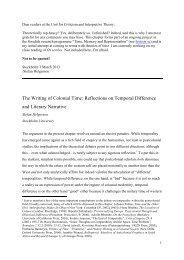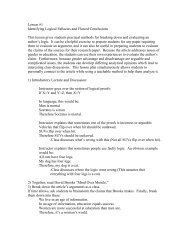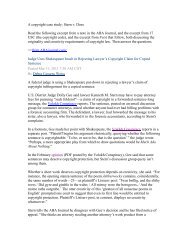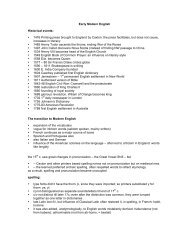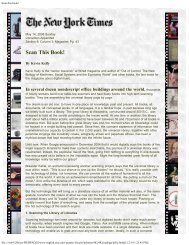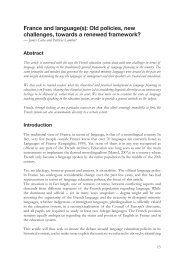Plagiarism, Norms, and the Limits of Theft Law: Some ... - English
Plagiarism, Norms, and the Limits of Theft Law: Some ... - English
Plagiarism, Norms, and the Limits of Theft Law: Some ... - English
Create successful ePaper yourself
Turn your PDF publications into a flip-book with our unique Google optimized e-Paper software.
J-GREEN2 12/18/02 10:48 AM<br />
212 HASTINGS LAW JOURNAL [Vol. 54<br />
Despite <strong>the</strong> breadth <strong>of</strong> such definitions, however, some courts<br />
have been reluctant to treat at least certain kinds <strong>of</strong> intangibles as a<br />
“thing <strong>of</strong> value.” 187 For example, in a leading Canadian case, Stewart<br />
v. The Queen, <strong>the</strong> court was called upon to interpret Section 283(1) <strong>of</strong><br />
<strong>the</strong> Criminal Code, which makes it a crime to take or convert<br />
“anything whe<strong>the</strong>r animate or inanimate” with <strong>the</strong> requisite intent. 188<br />
While acknowledging that <strong>the</strong> term “anything” should be construed<br />
broadly to refer to intangible things such as bank credit, <strong>the</strong> court<br />
declined to apply <strong>the</strong> statute in a case in which a defendant was<br />
prosecuted for attempting to obtain confidential payroll information<br />
about a hotel’s employees by paying one <strong>of</strong> <strong>the</strong> employees to copy <strong>the</strong><br />
information without actually taking any physical object. The court<br />
reasoned that rights to confidential information should not be<br />
regarded as property for purposes <strong>of</strong> Section 283(1) because such<br />
rights are more akin to fiduciary obligations than proprietary<br />
interests. 189<br />
Why are courts reluctant to treat intangibles as property for<br />
purposes <strong>of</strong> <strong>the</strong>ft law? In a very important sense, all “property” is<br />
intangible, since, as noted above, <strong>the</strong> term denotes nothing more than<br />
a bundle <strong>of</strong> rights, a legal construct. Yet, at an intuitive level, people<br />
do distinguish between property rights that inhere in physical objects<br />
<strong>and</strong> those that inhere in intangibles.<br />
Consider Ian McEwan’s marvelous novel, Atonement, <strong>of</strong> which I<br />
happen to own a copy. My ownership <strong>of</strong> this particular volume<br />
means that I have <strong>the</strong> right to exclude o<strong>the</strong>rs from using it, to transfer<br />
ownership to someone else, whe<strong>the</strong>r by sale or gift, or even to destroy<br />
it. If I loan it to a friend <strong>and</strong> it comes back with <strong>the</strong> pages torn <strong>and</strong><br />
dog-eared, my copy is worth less than when it was new. If I give it<br />
away or sell it, I no longer own it. We can say that my rights are in<br />
187. See, e.g., Stewart v. Queen, [1988] 1 S.C.R. 963, discussed infra note 188 <strong>and</strong><br />
accompanying text. Of course, not every jurisdiction has adopted an MPC-type definition<br />
<strong>of</strong> property. <strong>Some</strong> continue to define property as it was defined at common law. See, e.g.,<br />
People v. Davis, 561 N.E.2d 165 (Ill. App. Ct. 1990); Commonwealth v. Rivers, 583 N.E.2d<br />
867 (Mass. App. Ct. 1991); Bruhn v. Commonwealth, 544 S.E.2d 895 (Va. Ct. App. 1986).<br />
188. 1 S.C.R. 963, 967 (Can. 1988). For commentary on <strong>the</strong> Stewart case as it worked its<br />
way up <strong>the</strong> appellate process, see R. Grant Hammond, <strong>Theft</strong> <strong>of</strong> Information, 100 LAW Q.<br />
REV. 252 (1984); Franklin R. Mosk<strong>of</strong>f, The <strong>Theft</strong> <strong>of</strong> Thoughts: The Realities <strong>of</strong> 1984, 27<br />
CRIM. L. Q. 226 (1984–85); Arnold S. Weinrib, Information <strong>and</strong> Property, 38 U. TORONTO<br />
L.J. 117 (1988).<br />
189. The question, what is a “thing <strong>of</strong> value,” also arises in <strong>the</strong> context <strong>of</strong> bribery law.<br />
See 18 U.S.C. § 201 (2000); 1 SARAH N. WELLING ET AL., FEDERAL CRIMINAL LAW AND<br />
RELATED ACTIONS: CRIMES, FORFEITURE, THE FALSE CLAIMS ACT AND RICO §7.3, at<br />
206–09 (1998).


